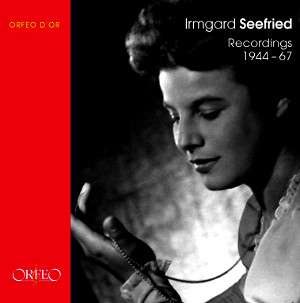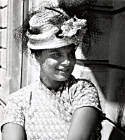
NEW RELEASES
NEW RELEASES of the last 12 months
COMING SOON
ARCHIVE
AWARDS
CDs
SACDs
LPs
MCs
CATALOGUE NUMBERS
|
|
ORFEO International – Catalogue
CDs
 | Irmgard Seefried
Recordings 1944-67Orfeo • 4 CD • 4h 32min Order No.: C 877 134 I |
|
Composers/Works: |
J. Haydn: Chi vive amante Hob. XXIVb:13
W.A. Mozart: Ach, ich fühl's, es ist entschwunden (from: Die Zauberflöte K 0620)
W.A. Mozart: Du also bist mein Bräutigam? (from: Die Zauberflöte K 0620)
L.v. Beethoven: Jetzt Schätzchen, jetzt sind wir allein
L.v. Beethoven: Armer Jaquino ... O wär' ich schon mit dir vereint (from: Fidelio op. 072)
C.M. v. Weber: Wie nahte mir der Schlummer - Leise, leise, fromme Weise (from: Der Freischütz)
R. Wagner: Gut'n Abend, Meister
R. Wagner: Hat man mit dem Schuhwerk - O Sachs! Mein Freund! (from: Die Meistersinger von Nürnberg WWW 0096)
G. Puccini: Ohne Mutter bist du, Kind, gestorben (from: Suor Angelica)
R. Strauss: Lieber Freund, verschaffen Sie mir die Geigen (from: Ariadne auf Naxos)
R. Strauss: Seien wir wieder gut - Musik ist eine heilige Kunst (from: Ariadne auf Naxos)
W.A. Mozart: Voi che sapete (from: Le nozze di Figaro K 0492)
W.A. Mozart: Giunse alfin il momento – Deh vieni non tardar (from: Le nozze di Figaro K 492)
W.A. Mozart: Ach, ich fühl's, es ist entschwunden (from: Die Zauberflöte K 0620)
W.A. Mozart: L'amerò, sarò costante (from: Il Rè Pastore K 208)
W.A. Mozart: Ruhe sanft, mein holdes Leben (from: Zaide K 0344)
W.A. Mozart: Exsultate, jubilate K 165 for Soprano, Organ and Orchestra
W.A. Mozart: Endlich naht sich – O säume länger nicht (from: Le nozze di Figaro K 0492)
W.A. Mozart: Temerari… Come scoglio (from: Così fan tutte K 0588)
W.A. Mozart: Ei parte… Per pietà, ben mio (from: Così fan tutte K 0588)
W.A. Mozart: Vado, ma dove? Oh dei! K 583
W.A. Mozart: Ch'io mi scordi di te - Non temer, amato bene K 505
W.A. Mozart: Non più, tutto ascoltai - Non temer, amato bene K 490
J. Haydn: She never told her love Hob. XXVIa:34 (1795 - from: Original Canzonettas Hob. XXVIa:31-36)
J. Haydn: Piercing Eyes Hob. XXVIa:35 (1795)
J. Haydn: The Spirit's Song Hob. XXVIa:41 (1800)
W.A. Mozart: Sehnsucht nach dem Frühlinge K 596
F. Schubert: Fischerweise op. 96 No. 4 D 881
F. Schubert: Im Frühling op. 101 No. 1 D 882
F. Schubert: Auf dem Wasser zu singen op. 72 D 774
F. Schubert: Seligkeit D 433
F. Schubert: Ganymed op. 19 No. 3 D 544
F. Schubert: Ellens Gesang III op. 52 No. 6 D 839 (Ave Maria)
F. Schubert: Gretchen am Spinnrade op. 2 D 118
R. Schumann: Der arme Peter op. 53 No. 3
R. Schumann: Der Nussbaum op. 25 No. 3 (1840)
R. Schumann: Widmung op. 25 No. 1 (1840)
J. Brahms: Auf dem See op. 59 No. 2
J. Brahms: Dein blaues Auge hält so still op. 59 No. 8
J. Brahms: Ruhe, Süßliebchen, im Schatten (from: Die schöne Magelone op. 33)
J. Brahms: Unbewegte, laue Luft op. 57 No. 8
J. Brahms: Feinsliebchen, du sollst mir nicht barfuß gehen WoO 33,12
J. Brahms: Schwesterlein, Schwesterlein WoO 33,15
J. Brahms: In stiller Nacht. zur ersten Wacht WoO 33,42
M. Mussorgsky: Mit der Njanja
M. Mussorgsky: Im Winkel
M. Mussorgsky: Der Käfer
M. Mussorgsky: Mit der Puppe
M. Mussorgsky: Abendgebet
M. Mussorgsky: Steckenpferdreiter
Anon.: Pierrot im Mondenschein
Anon.: F Trimouzet
A. Renard: Süßkirschenzeit
D. Milhaud: Der Apfel und die Schnecke
J. Kosma: Kinderlied im Winter
J. Kosma: Lied des Vogelstellers
J. Kosma: Die beiden Schnecken
J. Kosma: Schöne Jahreszeit
J. Kosma: Im Garten
J. Kosma: Fabel
|
Artists: |
Irmgard Seefried (Sopran)
Wiener Symphoniker (Orchester)
Leopold Ludwig (Dirigent)
Orchester der Wiener Staatsoper (Orchester)
Karl Böhm (Dirigent)
Chor der Wiener Staatsoper (Chor)
Wiener Philharmoniker (Orchester)
Herbert von Karajan (Dirigent)
Wilhelm Furtwängler (Dirigent)
Ferdinand Leitner (Dirigent)
London Mozart Players (Orchester)
Harry Blech (Dirigent)
New York Philharmonic (Orchester)
Bruno Walter (Dirigent)
Kölner Rundfunk-Symphonieorchester (Orchester)
Annemarie Bohne (Klavier)
Ernest Ansermet (Dirigent)
Erik Werba (Klavier)
Heinz Geese (Dirigent)
|
Irmgard Seefried - Recordings 1944-67
Although we shall already be commemorating the 25th anniversary of the death of Irmgard Seefried on 23 November 2013, this soprano’s magnificent artistry as demonstrated on the operatic stage, in the concert hall and in the genre of the lied is still remembered well by music-lovers today. She came originally from Swabia, and after making her stage debut in Aachen (where she worked for the first time with Herbert von Karajan) she moved to the Vienna State Opera in 1943 and remained attached to the house for more than thirty years. 
C 877 134 IShe developed into one of the most important singers of her time, especially in the Mozart repertoire. Her performances and recordings as Pamina in the Zauberflöte, Susanna in Le nozze di Figaro and Fiordiligi in Così fan tutte under conductors such as Karl Böhm and Joseph Krips made her into a role model for the generations after her. 
Irmgard Seefried, ca. 1949
Foto: Private archive Gottfried KrausExcerpts from these roles can be heard in this anniversary box from Orfeo. Many recordings by Irmgard Seefried that were hitherto unavailable, or available only in poor copies on the grey market, have here been rigorously restored. Our collection begins in the year 1944 and features excerpts from well-known radio productions under Karl Böhm (Mozart’s Zauberflöte, Beethoven’s Fidelio, Wagner’s Meistersinger and Strauss’s Ariadne auf Naxos) alongside other, less well-known recordings of individual arias by Haydn, Weber and Puccini under the baton of Leopold Ludwig. Her Mozart performances – which took her all over the globe – are documented here with various conductors including Ernest Ansermet, Wilhelm Furtwängler and Bruno Walter. Besides her star roles mentioned above we find works here such as the motet Exsultate, jubilate and the aria Non temer, amato bene, in which her husband Wolfgang Schneiderhan took on the violin solo part, as he often did during those years when Seefried was at the height of her career. Naturally, a homage to Irmgard Seefried cannot omit her song repertoire. This is documented here by a selection of radio recordings from the 1950s and ’60s. Whether in songs by Haydn and Mozart or by Schubert, Schumann and Brahms, her diction is always remarkable. Furthermore, her musical approach was thoroughly natural (in the best sense of the word) and this always allowed Seefried to establish a direct connection with her audience. This is especially the case for the programme chosen for the last CD in our new anthology, which at first glance seems a little odd: Mussorgsky’s Nursery songs, recorded in 1958 with her “constant” accompanist Erik Werba, and Chansons from three centuries, a German Radio broadcast from 1967. These add new, fascinating aspects to round off Irmgard Seefried’s artistic profile.
|
|

ORFEO
Chormusik & Oratorien
Edition zeitgenössisches Lied
Kammermusik
Lied
Musica Rediviva
Oper
Recital
Symphonie & Konzert
Weihnachten
ORFEO D'OR
Bayerische Staatsoper live
Bayreuther Festspiele live
Deutsche Oper am Rhein
Salzburger Festspieldokumente
Wiener Staatsoper live
Wiener Symphoniker
Dirigenten
Große Sänger d. 20. Jh.
Orchesterkonzerte
Quartette
Solisten
|